九年级英语作文复习课
- 格式:ppt
- 大小:270.00 KB
- 文档页数:17
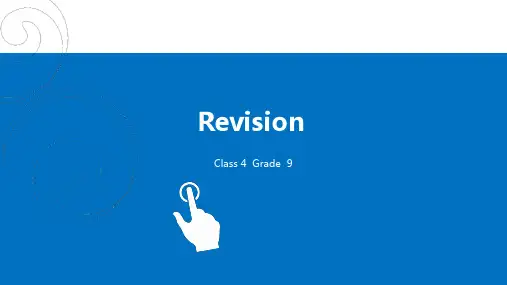

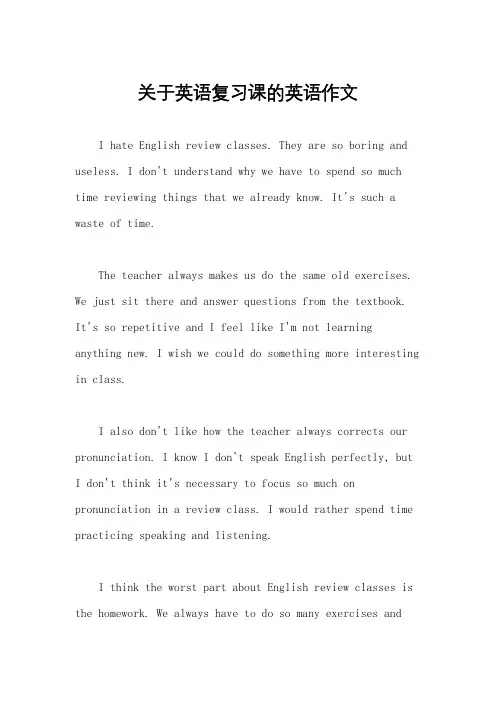
关于英语复习课的英语作文I hate English review classes. They are so boring and useless. I don't understand why we have to spend so much time reviewing things that we already know. It's such a waste of time.The teacher always makes us do the same old exercises. We just sit there and answer questions from the textbook. It's so repetitive and I feel like I'm not learning anything new. I wish we could do something more interesting in class.I also don't like how the teacher always corrects our pronunciation. I know I don't speak English perfectly, but I don't think it's necessary to focus so much on pronunciation in a review class. I would rather spend time practicing speaking and listening.I think the worst part about English review classes is the homework. We always have to do so many exercises andwrite long essays. It's so time-consuming and I never feel motivated to do it. I wish the teacher would give us more engaging and interactive assignments.Overall, I just don't see the point of English review classes. I think there are better ways to improve my English skills. I hope I don't have to take them anymore in the future.。
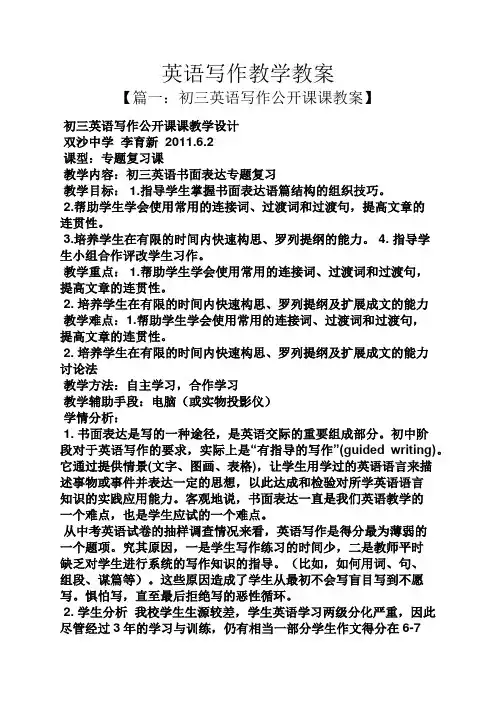
英语写作教学教案【篇一:初三英语写作公开课课教案】初三英语写作公开课课教学设计双沙中学李育新 2011.6.2课型:专题复习课教学内容:初三英语书面表达专题复习教学目标: 1.指导学生掌握书面表达语篇结构的组织技巧。
2.帮助学生学会使用常用的连接词、过渡词和过渡句,提高文章的连贯性。
3.培养学生在有限的时间内快速构思、罗列提纲的能力。
4. 指导学生小组合作评改学生习作。
教学重点: 1.帮助学生学会使用常用的连接词、过渡词和过渡句,提高文章的连贯性。
2. 培养学生在有限的时间内快速构思、罗列提纲及扩展成文的能力教学难点:1.帮助学生学会使用常用的连接词、过渡词和过渡句,提高文章的连贯性。
2. 培养学生在有限的时间内快速构思、罗列提纲及扩展成文的能力讨论法教学方法:自主学习,合作学习教学辅助手段:电脑(或实物投影仪)学情分析:1. 书面表达是写的一种途径,是英语交际的重要组成部分。
初中阶段对于英语写作的要求,实际上是“有指导的写作”(guided writing)。
它通过提供情景(文字、图画、表格),让学生用学过的英语语言来描述事物或事件并表达一定的思想,以此达成和检验对所学英语语言知识的实践应用能力。
客观地说,书面表达一直是我们英语教学的一个难点,也是学生应试的一个难点。
从中考英语试卷的抽样调查情况来看,英语写作是得分最为薄弱的一个题项。
究其原因,一是学生写作练习的时间少,二是教师平时缺乏对学生进行系统的写作知识的指导。
(比如,如何用词、句、组段、谋篇等)。
这些原因造成了学生从最初不会写盲目写到不愿写。
惧怕写,直至最后拒绝写的恶性循环。
2. 学生分析我校学生生源较差,学生英语学习两级分化严重,因此尽管经过3年的学习与训练,仍有相当一部分学生作文得分在6-7分之间甚至更低。
书面表达中式英语较多,连贯性较差。
很多学生对书面表达中快速构思和罗列提纲能力较差。
本堂课希望通过指导、帮助提高学生学会使用常用的连接词、过渡词和过渡句,提高文章的连贯性,帮助学生在有限的时间内快速构思、罗列提纲能力。
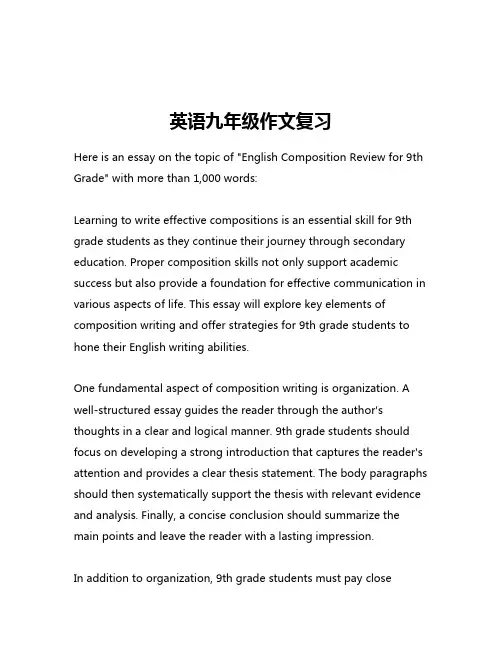
英语九年级作文复习Here is an essay on the topic of "English Composition Review for 9th Grade" with more than 1,000 words:Learning to write effective compositions is an essential skill for 9th grade students as they continue their journey through secondary education. Proper composition skills not only support academic success but also provide a foundation for effective communication in various aspects of life. This essay will explore key elements of composition writing and offer strategies for 9th grade students to hone their English writing abilities.One fundamental aspect of composition writing is organization. A well-structured essay guides the reader through the author's thoughts in a clear and logical manner. 9th grade students should focus on developing a strong introduction that captures the reader's attention and provides a clear thesis statement. The body paragraphs should then systematically support the thesis with relevant evidence and analysis. Finally, a concise conclusion should summarize the main points and leave the reader with a lasting impression.In addition to organization, 9th grade students must pay closeattention to the development of ideas within their compositions. Each paragraph should focus on a single, well-defined topic that contributes to the overall argument. Strong compositions utilize transitions to seamlessly link ideas and demonstrate the flow of thought. Students should also strive to incorporate varied sentence structures to maintain the reader's interest and convey their message effectively.Closely tied to idea development is the use of supporting evidence. 9th grade students should be adept at incorporating relevant quotes, paraphrases, and examples to substantiate their claims. The ability to properly introduce, explain, and analyze evidence is crucial for constructing a convincing argument. Additionally, students must learn to effectively integrate these support materials into their writing without disrupting the overall cohesion of the piece.Another essential element of composition writing is the use of appropriate language and style. 9th grade students should aim to employ a formal, academic tone throughout their essays. This includes using precise word choice, avoiding contractions and colloquialisms, and maintaining a third-person perspective. Additionally, students should be mindful of grammatical accuracy, including proper sentence structure, subject-verb agreement, and the consistent use of verb tenses.Beyond the technical aspects of composition writing, 9th grade students must also develop their creative and analytical thinking skills. Effective essays not only present factual information but also offer unique insights and interpretations. Students should strive to go beyond simply restating sources and instead synthesize information to formulate original arguments and conclusions. This level of critical thinking not only strengthens their compositions but also prepares them for the more advanced academic challenges they will face in the years to come.To support the development of these key composition skills, 9th grade teachers should incorporate a variety of instructional strategies. This may include modeling exemplary essays, providing constructive feedback on student work, and facilitating peer-review sessions. Students should also be encouraged to engage in the writing process, which involves brainstorming, drafting, revising, and editing their compositions. Additionally, teachers can assign a range of writing tasks, from persuasive essays to literary analyses, to expose students to different genres and purposes for composition writing.Furthermore, 9th grade students should be encouraged to seek out resources and support beyond the classroom. This may include utilizing online writing tools, such as grammar checkers and citation generators, as well as consulting with teachers, peers, or writingtutors for additional guidance and feedback. By taking a proactive approach to improving their composition skills, students can develop the confidence and competence needed to succeed in their academic endeavors and beyond.In conclusion, the development of effective composition writing skills is a crucial component of a 9th grade student's educational journey. By mastering elements such as organization, idea development, evidence usage, and language style, students can craft compelling essays that effectively communicate their thoughts and ideas. Through a combination of instructional support, individual practice, and access to resources, 9th grade students can cultivate the composition skills necessary for academic success and meaningful self-expression. With dedication and perseverance, these students will be well-equipped to tackle the increasingly complex writing challenges that lie ahead.。
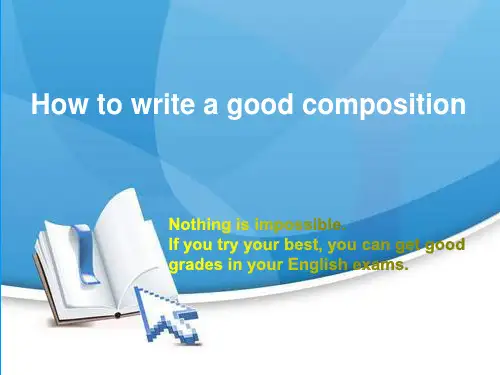

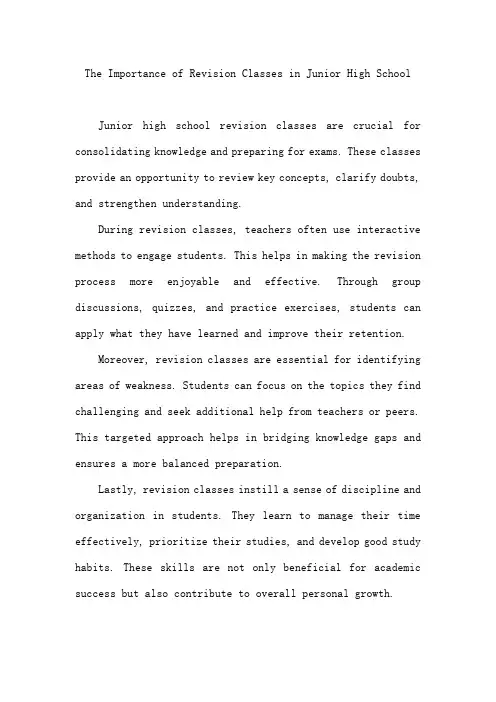
The Importance of Revision Classes in Junior High SchoolJunior high school revision classes are crucial for consolidating knowledge and preparing for exams. These classes provide an opportunity to review key concepts, clarify doubts, and strengthen understanding.During revision classes, teachers often use interactive methods to engage students. This helps in making the revision process more enjoyable and effective. Through group discussions, quizzes, and practice exercises, students can apply what they have learned and improve their retention.Moreover, revision classes are essential for identifying areas of weakness. Students can focus on the topics they find challenging and seek additional help from teachers or peers. This targeted approach helps in bridging knowledge gaps and ensures a more balanced preparation.Lastly, revision classes instill a sense of discipline and organization in students. They learn to manage their time effectively, prioritize their studies, and develop good study habits. These skills are not only beneficial for academic success but also contribute to overall personal growth.In conclusion, revision classes play a pivotal role in junior high school education. They are vital for enhancing learning outcomes, improving retention, and preparing students for future challenges.。

九年级英文写作复习资料写作是英语学习中的重要部分,可以帮助学生提高语文表达能力和创造力。
下面是一些九年级英文写作复习资料,包括写作技巧、常用表达和写作范文等。
一、写作技巧1.明确写作目的:在开始写作前,要明确自己写作的目的是什么,是要阐述观点、讨论问题还是提出建议。
2.组织结构清晰:写作中要有清晰的组织结构,包括引入、正文和结尾三个部分。
引入部分用于吸引读者的注意力,正文部分是要详细阐述自己的观点,结尾部分总结全文或给出建议。
3.合理运用连接词:在写作中要合理运用连接词,如firstly, secondly, however等,使文章更加连贯和流畅。
4.恰当应用句型:写作时要恰当应用各种句型,如倒装句、强调句等,使文章更加多样化和有趣。
二、常用表达1.引言句型:- Nowadays, it is widely believed that... 如今,人们普遍认为...- With the development of... 随着...的发展...- It is undeniable that... 不可否认的是...2.观点表达:- From my point of view, ... 从我的角度来看,...- It goes without saying that... 毫无疑问的是...- It is obvious that... 很明显的是...3.举例说明:- For example, ... 例如...- A good case in point is... 一个很好的例子是...- Take... as an example, ... 以...为例,...4.转折表达:- However, ... 然而,...- On the contrary, ... 相反,...- Despite this, ... 尽管如此,...三、写作范文1.议论文范文Topic: Should smoking be banned in public places?With the increasing awareness of the harmful effects of smoking, the debate on whether smoking should be banned in public places has become more intense. From my point of view, smoking should definitely be banned in public places.Firstly, smoking is harmful to both smokers and non-smokers. Secondhand smoke can cause various diseases, such as lung cancer and asthma. Banning smoking in public places would protect non-smokers from the dangers of secondhand smoke.Secondly, smoking in public places sets a bad example for young people. Teenagers are more likely to start smoking if they see others doing it. By banning smoking in public places, we can create a healthier environment for our youth.In conclusion, smoking should be banned in public places. It not only harms smokers themselves, but also puts non-smokers at risk. Furthermore, it sets a bad example for young people. Therefore, it is necessary to take actions to ban smoking in public places.2.应用文范文Topic: Write an email to your friend inviting him/her to your birthday party.Dear [Friend's Name],I hope this email finds you well. I am writing to invite you to my birthday party, which will be held on [Date] at [Location]. I would be delighted if you could join me in celebrating this special day.The party will start at [Time] and will include various activities, such as games, music, and of course, a delicious birthday cake. It will be a great opportunity for us to gather together and have fun.Please let me know as soon as possible if you are able to attend, so that I can make the necessary arrangements. I am looking forward to seeing you and spending this special day with you.Best regards,[Your Name]以上就是九年级英文写作复习资料的内容。
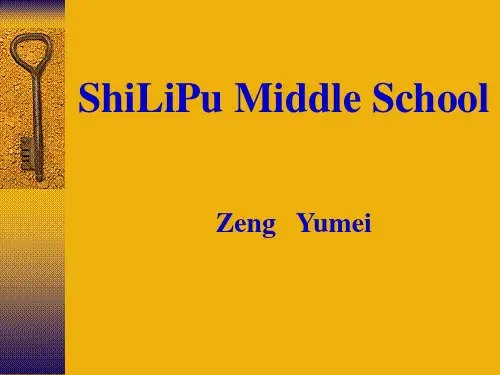
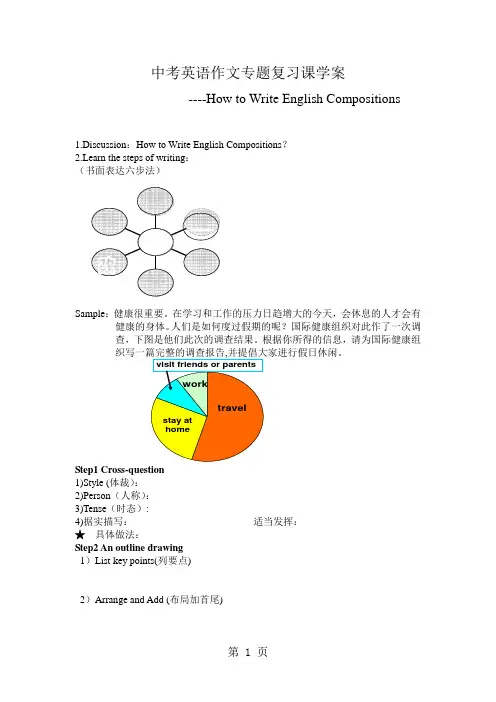
中考英语作文专题复习课学案----How to Write English Compositions1.Discussion :How to Write English Compositions ?2.Learn the steps of writing :(书面表达六步法)Sample :健康很重要。
在学习和工作的压力日趋增大的今天,会休息的人才会有健康的身体。
人们是如何度过假期的呢?国际健康组织对此作了一次调查,下图是他们此次的调查结果。
根据你所得的信息,请为国际健康组织写一篇完整的调查报告,并提倡大家进行假日休闲。
n t sStep1 Cross-question1)Style (体裁):__________2)Person (人称):_________3)Tense (时态): _________________4)据实描写:_________________适当发挥:_________________ ★ 具体做法:_________________Step2 An outline drawing1)List key points(列要点)___________________________________________________________________ __________________________________________________________________2)Arrange and Add (布局加首尾)________________________________________________________________________________________________________________________________________改★Structure:(作文一般框架:文章分3段)Begging(开头):概括性强,尽量2句话引入主题;Body(正文):主要内容:展开描述,层次性强,要有过渡型连接词。
九年级人教版英语专题复习作文公开课全文共6篇示例,供读者参考篇1Hey there! My name is Timmy and I'm a 9-year-old elementary school kid. I recently had the chance to attend a really cool English review lesson for 9th graders using the PEP textbooks. Even though I'm much younger, I found it super interesting and learned a ton of new stuff!The teacher, Mrs. Roberts, started off by going over some basic grammar concepts like parts of speech, verb tenses, and sentence structures. I'll be honest, some of it was a bit over my head at first since I'm still learning. But Mrs. Roberts explained everything in a really clear and simple way using lots of examples and even some fun games!Next up, we practiced vocabulary. We went through lists of words grouped by topic like animals, foods, household items, that kind of thing. Mrs. Roberts had us do activities where we raced to put words into the right categories or came up with sentences using new vocab words. It was kind of like the games Iplay in my English classes, but a bit more advanced of course. I tried my best to keep up!Then we moved on to the real meaty stuff - reading comprehension! Mrs. Roberts had the class read through some passages and stories from their textbooks. After each one, she asked questions to see how well we understood what we read. Some questions were pretty straightforward, just checking basic facts篇2A Jolly Good English Review Lesson!Hello there, my name is Timmy, and I'm a cheeky little lad who loves to learn and have fun! Today, I'm going to tell you all about the most smashing English review lesson I had in my9th-grade class. Buckle up, mates, because it's going to be a jolly good ride!It was a bright and sunny morning when I skipped into my English classroom, eager to learn something new. Our teacher, Mrs. Fitzpatrick, greeted us with her usual warm smile and a twinkle in her eye. "Good morning, class!" she exclaimed. "Today, we're going to have a special review lesson to help you prepare for your upcoming exam."I couldn't help but feel a little nervous at the mention of an exam, but Mrs. Fitzpatrick had a way of making even the most tedious topics seem like a grand adventure. She began by dividing us into small groups and giving each group a set of flashcards with vocabulary words, grammar rules, and idioms from our People's Education Press textbook."Alright, my little scholars," she said, clapping her hands together. "I want you to work together and come up with creative ways to review these materials. You can act out skits, sing songs, or even create games – the sky's the limit!"My group huddled together, and after a bit of brainstorming, we decided to create a game show called "The English Extravaganza!" We assigned roles: I was the host, while my friends played the contestants. We even made silly costumes out of construction paper and pipe cleaners.As the host, I strutted across the classroom, holding an imaginary microphone and donning a top hat made of newspaper. "Welcome, one and all, to The English Extravaganza!"I bellowed in my best game show voice. "Let's meet our contestants!"My friends introduced themselves with over-the-top personas, and the game began. We asked each other questionsabout vocabulary, grammar, and idioms, and if someone got an answer wrong, they had to do a silly dance or tell a joke as a penalty.The classroom was filled with laughter and excitement as we reviewed the material in the most entertaining way possible. Even Mrs. Fitzpatrick couldn't help but chuckle at our antics.After a few rounds of the game, we switched gears and moved on to acting out skits. One group performed a hilarious skit about a family of mice trying to learn English idioms, while another group sang a catchy song about irregular verbs to the tune of a popular nursery rhyme.As the lesson progressed, I realized that I was learning and retaining the material much better than I ever had before. By turning the review into a fun and interactive experience, Mrs. Fitzpatrick had managed to make even the driest grammar rules seem engaging and memorable.Before we knew it, the bell rang, signaling the end of the class. As we gathered our belongings, Mrs. Fitzpatrick smiled proudly at us. "Well done, my young scholars!" she exclaimed. "You've proven that learning can be both educational and entertaining. I have no doubt that you'll all do splendidly on the exam."As I skipped out of the classroom, my mind was buzzing with all the new knowledge I had acquired. Who knew that reviewing for an exam could be so much fun? Thanks to Mrs. Fitzpatrick's innovative teaching methods and our creative group activities, I felt confident and prepared for whatever challenges lay ahead.From that day on, I approached my studies with a newfound enthusiasm and a belief that learning could be a joyous adventure. And whenever I felt overwhelmed or bored, I remembered the English Extravaganza and the power of turning even the most mundane tasks into a grand spectacle.So, there you have it, mates – a jolly good tale of an English review lesson that was anything but dull. Who knows, perhaps one day I'll become a famous author or a renowned educator, inspiring others to embrace learning with the same zest and zeal that Mrs. Fitzpatrick instilled in me. Until then, I'll keep practicing my vocabulary words, mastering those pesky grammar rules, and always remembering to have a jolly good time while doing it!篇3Title: My Experience at the 9th Grade English Review Open ClassHey there, my name is Lily, and I'm a 9th-grade student at Sunshine Middle School. Last week, our English teacher, Ms. Wang, organized an open class for us to review the important topics we've learned from the People's Education Press English textbook. It was a unique experience, and I wanted to share it with you!First of all, let me tell you how the open class was set up. Instead of having a regular class in our classroom, we gathered in the school auditorium, and not just our class, but students from other 9th-grade classes too! The auditorium was filled with excited students, and I could feel the energy in the air.Ms. Wang started the class by welcoming us all and explaining the purpose of the open class. She said that it was a great opportunity for us to review the key topics we've covered so far, and to learn from each other through interactive activities and presentations.The first part of the open class was dedicated to grammar review. Ms. Wang divided us into small groups, and each group was given a different grammar topic to work on. My group was assigned the topic of tenses, and we had to create a skit or a short play that demonstrated the correct usage of different tenses.We had so much fun working together and coming up with a silly storyline that involved time travel and various tenses. When it was our turn to present, we acted out our skit, and the other students had to identify the different tenses we used. It was a great way to learn and practice grammar in an engaging and entertaining way.After the grammar review, we moved on to vocabulary and reading comprehension. This time, Ms. Wang organized a quiz competition, where teams competed against each other by answering questions related to the vocabulary and reading passages from our textbook.The questions were projected on a big screen, and each team had to send a representative to the front to answer. It was nerve-wracking, but also really exciting! My team did pretty well, and we even managed to come in second place, which was awesome.During the break, we had the opportunity to visit different booths set up by our classmates. Each booth focused on a specific topic, such as writing, speaking, or listening comprehension. At the writing booth, for example, students could get feedback on their essays or ask questions about writing techniques.I visited the speaking booth, where my friend Jessie was stationed. She had prepared a fun role-playing activity for us, where we had to pretend to be tourists asking for directions or ordering food at a restaurant. It was a great way to practice our speaking skills in a relaxed and supportive environment.The final part of the open class was a debate competition. Two teams were formed, and they had to debate a controversial topic related to our course material. The topic was "Should students be allowed to use smartphones in class?"Both teams presented their arguments passionately, and the audience was encouraged to ask questions or share their opinions. It was fascinating to see how our classmates could articulate their thoughts and counter each other's arguments respectfully.In the end, the judges declared a tie, as both teams had made compelling points. Ms. Wang congratulated everyone on their hard work and participation, and she reminded us that the open class was not just about reviewing material, but also about developing critical thinking, communication, and collaboration skills.As the open class came to an end, I felt a sense of accomplishment and excitement. Not only had I reinforced myunderstanding of the topics we've covered in our English textbook, but I had also had the opportunity to learn in a fun and interactive way.The open class made me appreciate the importance of English as a language and the skills it can help us develop. It also showed me that learning can be enjoyable and engaging when it's done in a creative and collaborative way.Overall, the 9th grade English review open class was a fantastic experience. It was a day filled with laughter, teamwork, and a shared love for learning. I can't wait for the next open class, and I'm sure my classmates feel the same way!篇4My English Public Lesson ReviewWoohoo! We just had the coolest English public lesson ever! It was all about the topic of "Environmental Protection" from our 9th-grade English textbook. I know, I know, it might sound like a boring topic, but trust me, it was mind-blowing!Our English teacher, Mrs. Wang, is always trying to make our lessons fun and engaging. This time, she really outdid herself. Instead of just lecturing us about environmental issues, sheturned the whole thing into an interactive experience. We even had special guests join us – how cool is that?The lesson started with a short video about the importance of protecting our planet. It showed us how things like pollution, deforestation, and climate change are affecting the world we live in. Seeing all those images of smog-filled cities, barren landscapes, and melting glaciers really hit home. It made me realize how serious this issue is and how we all need to do our part to take care of Mother Earth.After the video, Mrs. Wang asked us to share our thoughts and feelings about what we had just seen. Hands shot up all over the classroom, and we had a lively discussion about the different environmental problems facing our world today. Some of my classmates talked about the plastic pollution in our oceans, while others brought up the issue of endangered species. It was great to see everyone so engaged and passionate about the topic.But the real highlight of the lesson was when our special guests arrived. Mrs. Wang had invited representatives from a local environmental organization to come and talk to us. They showed us all sorts of cool things, like how to make eco-friendly cleaning products at home and how to start a recycling program in our school.One of the coolest things they did was bring in a bunch of everyday items and challenge us to find ways to reuse or repurpose them. It was like a giant game of "Reduce, Reuse, Recycle." We had to get creative and think outside the box. My group turned an old t-shirt into a shopping bag and an empty juice carton into a pencil holder. It was so much fun, and it really drove home the importance of reducing waste.But the best part of the lesson was when we got to go outside and plant some trees. Can you believe it? We actually got to roll up our sleeves and get our hands dirty! The environmental reps showed us how to properly plant saplings and gave us tips on how to care for them as they grow.As we were planting, I couldn't help but feel a sense of pride and accomplishment. I know it might seem like a small thing, but those little trees represent our commitment to making the world a greener, healthier place. Every time I walk by them on the school grounds, I'll be reminded of the important lessons we learned during that public lesson.Overall, it was an amazing experience, and I learned so much about environmental protection. I never realized how many little things we can do in our daily lives to reduce our carbon footprint and live more sustainably. From using reusable water bottles andshopping bags to turning off lights when we leave a room, every little bit helps.I also learned that protecting the environment isn't just about doing our part individually; it's about coming together as a community and working towards a common goal. If we all pitch in and do our part, we can make a real difference.So, a huge thank you to Mrs. Wang and our special guests for making this public lesson so engaging, informative, and fun. I can't wait to put what I've learned into practice and continue doing my part to protect our beautiful planet. After all, it's the only one we've got, and it's up to us to take care of it.Who knew learning about environmental protection could be so cool? I guess that's just another example of how awesome English class can be when you have a teacher who really knows how to make the lessons come alive!篇5My Journey Through 9th Grade EnglishHi everyone! My name is Xiaoming and I'm a 9th grade student. Today, I want to share my experience learning Englishthis year using the People's Education Press textbooks. It's been quite a rollercoaster ride, but I've learned so much!To start off, remember how in 7th grade we learned basic sentences and expressions? Well, this year we really took it to the next level. One of the first topics we covered was making suggestions using phrases like "We could...", "Why don't we...?", and "How about...?". At first, it was kind of tricky remembering all the different ways to make suggestions politely. But after doing lots of practice dialogues with my classmates, it started to feel natural.Then we moved on to the past tense, like using "went", "saw", and "did" to talk about things that already happened. That was cuando la diversión comenzó! We had to describe our favorite memories from childhood - everything from birthdays to family vacations. I'll never forget Zhangsan's hilarious story about the time he got stuck in a tree as a little kid and the firefighters had to rescue him!Speaking of stories, one of the units focused on narrative tenses - using "was/were" for background information and details, with past simple for the main events. We read some pretty cool adventure tales and had to retell the plots in our ownwords. Retelling stories pushed me to really pay attention to all the little details to make my narration coherent and engaging.Oh, and let's not forget about describing people's personalities and behaviors. We learned tons of new adjectives like "outgoing", "ambitious", and "down-to-earth". Then we put them into practice writing character sketches about our friends, families, celebrity idols - you name it! I had so much fun analyzing the personalities of my favorite athletes and pop stars.What else...oh yeah, giving opinions and preferences! This unit was all about expressing our viewpoints using "I think...", "In my opinion...", "I prefer...", and "I'd rather...". We had all kinds of lively debates on controversies like:"Which is better - books or movies?", "Should we have more homework or less?", and even "What's the best food in the world?". Let me tell you, trying to persuade Ms. Wang that pizza is objectively the GOAT cuisine was one of the toughest challenges I faced all year!From there, we tackled comparisons using "as...as", "more/less...than", and all those "er" and "est" forms. I'll be honest, those comparable and superlative adjectives twisted my tongue into a pretzel sometimes. How do you say "prettier" again? Was it "prett-ier" or "prett-yer"? Ugh, I got them mixed upconstantly! But comparing different places, objects, and abilities really expanded my English vocabulary.Then towards the end of the semester, we did a whole unit on the present perfect tense, like "I have been" and "She has gone". Using that tense to talk about experiences from our lives felt formal at first, but it let me describe things in a lot more detail. Like "I have traveled to Beijing twice - once in 2019 and again last summer." See? So much more specific than just saying "I went to Beijing"!There was also a unit on modal verbs like "can", "should", "may", "have to" and so on. Those helped me communicate obligations, permissions, and possibilities more precisely. Like, "You should turn in your homework on time" is very different from "You have to turn it in on time"! One is friendly advice, while the other is a strict requirement. No más dejar las tareas para la últim a hora!What else was there...oh yes, discussing future plans and ambitions! I loved using "going to" and "will" to talk about what I want to do after graduation. Things like, "I'm going to study science in university" or "I will become a professional athlete one day". We also learned fun expressions like "I can't wait to..." and"My dream is to...". Just hearing my classmates' life goals and aspirations really motivated me to aim high.Hmm, I think that covers most of the major topics we studied this year. Although...oh yes, how could I forget - the dreaded Grammar unit! Ugh, I still get dizzy just thinking about all those grammar rules we had to memorize. Countable and uncountable nouns, subject-verb agreement, proper use of articles likeed English spelling! Those weeks felt like an endless slog through the deepest, darkest grammar jungle.But you know what? Surviving that unit only made me stronger and more determined. If I can make it through that many grammar drills, I can make it through anything! I just had to listen to the teacher's advice: "Practice makes perfect! The more examples and exercises you do, the easier it will become." And eventually,...it really did get easier. The grammar rules started sticking in my brain without me even trying. Soon enough, I could navigate even the trickiest sentences without breaking a sweat.Now, as I wrap up 9th grade, I can't believe how much my English has improved over the course of this year. From making suggestions to discussing ambitions, from narrating stories to analyzing personalities, I feel like I've grown so much as aspeaker, writer, thinker, and learner. I'm really going to miss these textbooks and the adventures they took me on.So thank you, People's Education Press, for an amazing year. Thanks to my teachers for their patience and excellent guidance. Thanks to my classmates for being there through all the struggles and breakthroughs. And thank you, English, for being one of the most useful, fascinating subjects I've ever studied. I can't wait to see where you take me next!篇6An Open Class to Remember!Hey there! Alex here, just a regular 9th grader trying to make it through middle school. But let me tell you, the open class we had last week reviewing for our big English exam was anything but regular!It all started when our English teacher Ms. Wang announced that we'd be having a special open class to go over all the key topics for the exam. I have to admit, I wasn't exactly thrilled at the idea of spending an entire afternoon reviewing boring grammar rules and vocabulary words. Little did I know just how wrong I was!The Open Class BeginsWhen the day arrived, Ms. Wang had the whole classroom decked out in a really cool "English Village" theme. There were signs labeling different areas as the "Grammar Galaxy," "Vocabulary Valley," and even a "Reading Rainforest!" My friends and I thought it looked pretty awesome.Ms. Wang kicked things off by splitting us into teams and explaining that the open class would be a series of fun, interactive activities and games related to what we'd been learning. Suddenly, an afternoon of studying didn't seem so bad!The Grammar GalaxyOur first stop was the Grammar Galaxy, where we played a bunch of games testing our skills with things like verb tenses, parts of speech, and forming questions. One game had us running back and forth between labeled cones, rearranging jumbled words into proper sentences.Another had two teams competing to build the longest "sentence tower" by stacking up colored blocks representing different parts of a sentence. We had to get the subject, verb, and other components in the right order. It was a blast, and I wassurprised by how much it actually helped reinforce the grammar concepts.Vocabulary ValleyAfter stretching our grammar muscles, we headed over to Vocabulary Valley. This area had a whole bunch of activities for building our vocabulary skills. My favorite was the Word Ranch, where we had to wrangle words into their proper meanings by lassoing them off a list and mounting them on comeback posts.There was also the VocabOlympics, where we split into teams and competed in goofy events like the Synonym Sprint and Category Catapult. The games pushed us to really understand shades of meaning and how words relate to one another. I'll never forget the roars of laughter when one team launched a life-sized stuffed pig across the room in the Category Catapult event (the category was farm animals)!The Reading RainforestLast but not least, we ventured into the Reading Rainforest to practice our reading comprehension abilities. For this section, Ms. Wang had decorated the area to look like an actual rainforest, with hanging vines, trees, and even some stuffed monkeys and parrots!We started by going in groups to different rainforest "campsites" where we read short passages, then had to discuss and answer questions about things like the main idea, drawing inferences, and identifying the author's perspective. It was a pretty cool way to get us thinking critically about the texts.My personal favorite was the Tangled Interpretation game, where two teams had to compete to properly sequence a jumbled rainforest story by piecing together a clothesline of mixed-up sentences and illustrations. Some of the sentences made no sense at first, so we really had to think it through.The Open Class ConclusionWhen the open class finally ended after a whirlwind of activities, I was genuinely sad it was over! Ms. Wang had done an incredible job of making the whole review process so engaging and fun. We'd laughed, played, and best of all, learned SO much without even realizing it. I felt way more prepared and confident for the exam.As we were leaving, Ms. Wang revealed that she'd been filming short videos throughout the day. She wanted to create a video showcasing the English Village for teachers at other schools to use as inspiration. How cool is that?I have to say, that open class was easily one of the most memorable learning experiences I've ever had. Not just because it was wildly entertaining, but because of how effective all the interactive games and activities were for solidifying what we'd been learning.Ms. Wang showed that studying and preparing for a big test doesn't have to be an endless grind of lectures and worksheets. With some creativity, it can Actually be an incredibly fun, engaging process! An open class like that is something I'll never forget.So if you're reading this and have a big exam coming up, remember - embrace the process, get into it, and you might just surprise yourself with how much you can learn while having a blast. Thanks Ms. Wang for the awesome open class!。